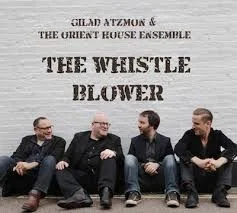Jack Goodstein: Gilad Atzmon and the Orient House Ensemble – ‘The Whistle Blower’
http://blogcritics.org/music-review-gilad-atzmon-and-the-orient-house-ensemble-the-whistle-blower/
Politically controversial multi- instrumentalist/composer Gilad Atzmon’s The Whistle Blower, released in March in the United Kingdom on his Fanfare Jazz label, is now available in the United States from MoonJune Music. The album features eight Atzmon originals, with the composer fronting The Orient House Ensemble—Frank Harrison (piano, keyboards), Yaron Stavi (double bass, electric bass), and Chris Higginbottom (drums).
The set begins with “Gaza Mon Amour,” a lively nod to his Middle Eastern roots. It ends with a short, almost comic version of the album’s title song that has the whole ensemble joining guest vocalists Tali Atzmon and Antonio Feola. While both compositions’ titles suggest a political agenda, their musical energy seems agenda-free. Atzmon’s limited liner notes would seem to echo the album’s emphasis on art as well as politics: “As I get older, I become more cynical. I see the lies, the theft, and the processes that suppress truth. The song, the chanson, the melodic line, the battle and laughter are the only bearers of authenticity. Beauty, enchantment and sacrifice are the means by which the self comes to grasp its selfhood.”
Song, melody, and laughter are the soul of this album. “Forever” is a ballad that seems to float melodically on Atzmon’s soprano sax. “The Romantic Church,” somewhat surprisingly has the kind of dark vibe that would have fit well in one of those noir films of the mid-20th century. “Let Us Pray” is an extended hymn marked by the intensity of the wailing sax and the subtlety of the piano. Individual solos lead to a unifying conversation between the two.
On the other hand, “The Song” has Atzmon on the accordion in a short, melodic ballad that fairly reeks with European nostalgia. The appropriately sultry and smoky “For Moana” is written for the Italian actress and politician Moana Pozzi. Although it has its quirky moments, “To Be Free” builds in intensity to a crescendo that has Atzmon’s sax screaming in passionate commitment. It may well be the most political moment on the album.
Certainly there will be those for whom it is impossible to separate a man’s music from his politics. In the case of The Whistle Blower, that’s their loss.
